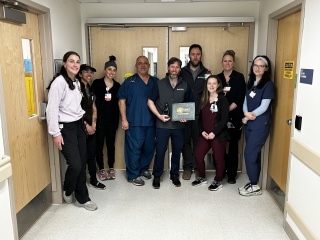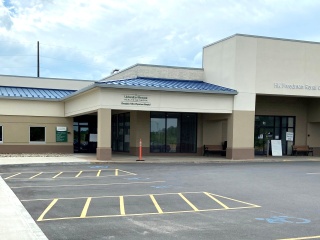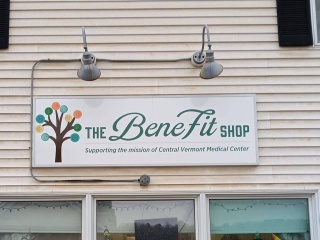
Latest stories and news from our rural academic health system and the people we serve.
Latest News

By the Numbers
The people who we serve across our region have access to an anchor academic medical center, two community hospitals, three critical access hospitals, a children’s hospital, a multispecialty provider group, cancer centers, a home health and hospice service provider and skilled nursing centers — all in close partnership with our academic partners.
Review our local and regional impact data from FY24 below.
- Total Impact (Indirect & Direct): $3.5 Billion*
- Jobs Supported: 23,600*
- Tax Revenue Generated: $465 Million*
- Community Benefit Impact (990): $432 Million*
- Employees: 16,138
- Licensed Beds: 1,465 (1,045 Acute Care beds, 420 Long-Term Care Beds)
- Outpatient Care Sites: 141
- Care & Service Programs: 235
- Employed Providers: 1,842 (1,358 Providers, 484 Advanced Practice Practitioners)
- Patient Care Encounters: 2,584,887 (181,611 Emergency Visits)
- Academic Training Partners: 49 (17 Universities; 6 Community Colleges; 10 Career Centers; 16 High Schools)
- Investment in Academic Training Programs (2020-24): $16,568,956 Million
- Clinical Trials/Studies: 1,245 Active 1,076 (86%) Clinical Trials; 325 (30%) Cancer-Related Clinical Trials
* Projected
- Employees: 10,039
- Population of Hospital Primary Service Area:
- 1,000,000 (Hospital Referral Region)
- 178,000 (Hospital Primary Service Area)
- Licensed Beds: 562 Acute Care beds
- Employed Providers: 1,144 (871 Providers, 273 Advanced Practice Practitioners)
- Patient Care Encounters: 1,348,827 (69,772 Emergency Visits)
- Percent of Physicians Practicing in Vermont Who Trained at University of Vermont Medical Center:
- 33% (682)
- 20% (414) Robert Larner, MD College of Medicine Graduates
- 22% (445) UVM Medical Center Fellows or Residents
- Employees: 2,384
- Population of Hospital Primary Service Area: 86,000
- Licensed Beds: 320 (286 Acute Care beds, 34 Long-Term Care Beds)
- Employed Providers: 235 (178 Providers, 57 Advanced Practice Practitioners)
- Patient Care Encounters: 368,258 (39,751 Emergency Visits)
- Number of Employees: 1,502
- Population of Hospital Primary Service Area: 68,000 Licensed Beds: 275 (122 Acute Care Beds, 153 Long-Term Care Beds)
- Employed Providers: 194 (117 Providers, 77 Advanced Practice Practitioners)
- Patient Care Encounters: 408,696 (28,029 Emergency Visits)
- Employees: 737
- Population of Hospital Primary Service Area: 32,000
- Licensed Beds: 123 (25 Acute Care beds, 98 Long-Term Care Beds)
- Employed Providers: 98 (63 Providers, 35 Advanced Practice Practitioners)
- Patient Care Encounters: 205,615 (13,921 Emergency Visits)
- Employees: 767
- Population of Hospital Primary Service Area: 32,000
- Licensed Beds: 160 (25 Acute Care Beds, 135 Long Term-Care Beds)
- Employed Providers: 89 (59 Providers, 30 Advanced Practice Practitioners)
- Patient Care Encounters: 172,839 (14,216 Emergency Visits)
- Employees: 365
- Population of Hospital Primary Service Area: 16,000
- Licensed Beds: 25 Acute Care Beds
- Employed Providers: 79 (68 Providers, 11 Advanced Practice Practitioners)
- Patient Care Encounters: 80,652 (15,922 Emergency Visits)
- Employees: 344
- Patients Served: 4,547
- Hours of Care Provided: 234,154
- Number of Home Visits: 95,477
- Days of Care Provided at McClure Miller Respite House: 4,320
Media Center
To aid in your reporting, the Media Center provides media professionals with photography, video content and quick facts about University of Vermont Health.

The Beat
We’re working to bring you world-class care every day. Read inspiring, in-depth stories from patients and providers across UVM Health.


We're a nonprofit, academic health system rooted in rural communities across Vermont and northern New York, committed to building a healthier, more equitable tomorrow.

